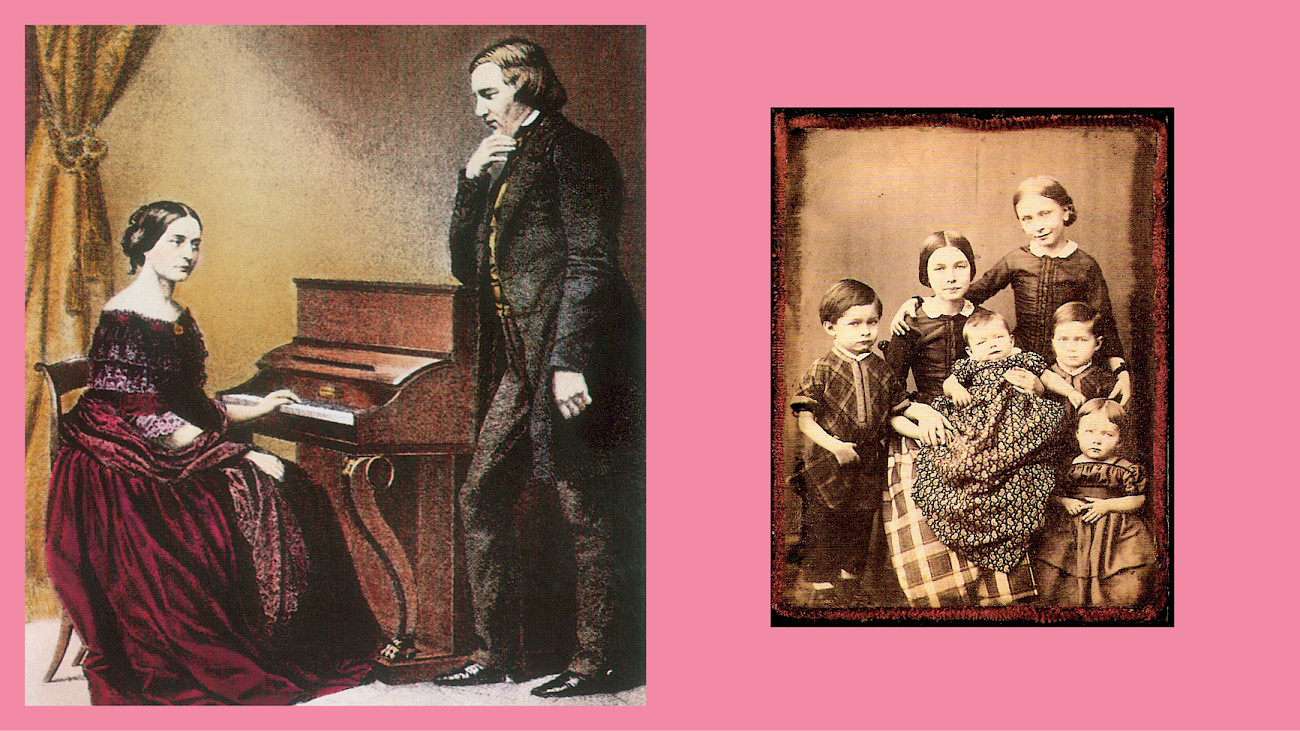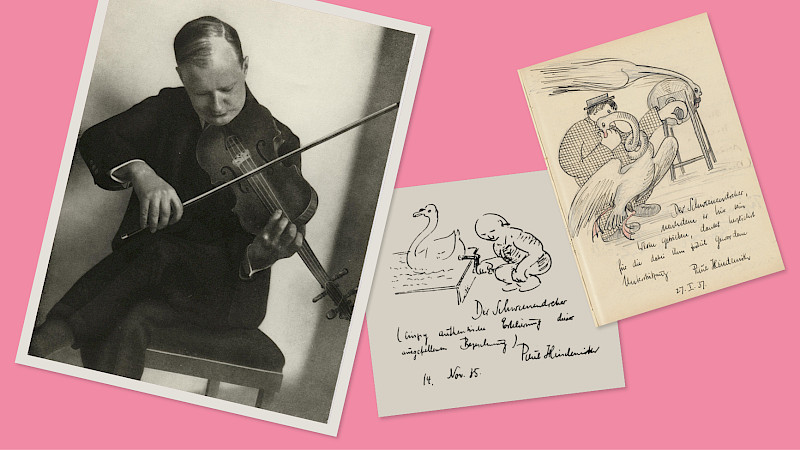
Love, suffering and music
Robert Schumann's family has many stories to tell - exciting, romantic and sad.
Robert Schumann was born on 8 June 1810 in Zwickau, Saxony. He was the baby of the family: his brothers Eduard, Carl and Julius were five to eleven years older than him, his sister Emilie already 14. His parents, his mother Christiane ("a fundamentally musical nature, although she could not read a note") and the publisher August, were delighted with the latecomer, who was actually initially to be called Medardus. Robert Schumann later said that he had enjoyed "the most careful and loving upbringing".
However, life was not idyllic: his mother fell ill with typhoid fever and he was placed in the care of a family friend several times between the ages of three and five. When he was seven years old, Emilie, who suffered from depression from an early age, was committed to a so-called "lunatic asylum". in 1825, she committed suicide by throwing herself out of a window. A year later, his father, who had been struggling with his health for some time, died unexpectedly. this was followed by the death of his brother Julius in 1833 and his mother three years later. His brother Eduard died in 1839, and these many strokes of fate at a young age had a strong influence on the composer. They are probably also the reason why Schumann alternated between highly productive and depressive phases. Nevertheless, he found conditions that many would have envied: his family stuck together and encouraged his talent. His parents were sensitive to the literary and musical ambitions of their youngest son.
After his father's death, the Zwickau cloth and ironmonger Gottlob Rudel became his guardian. He and his mother decided that Robert Schumann should pursue a career in law. He went to Leipzig to study law - the city of trade fairs and the book trade. Shortly after his arrival, he met the music teacher Friedrich Wieck (on 31 March 1828) - as well as Wieck's most successful pupil, his eight-year-old daughter Clara. Schumann certainly never dreamed that this would be the day he met the love of his life.
Fight for "Zilia"
After two years of study, Robert Schumann decided to focus everything on music. His mother wrote a letter to Friedrich Wieck in Leipzig so that he could become his pupil - opening a new chapter in the family history.
The story of Robert and Clara reads like a romance novel. They had their first kiss in November 1835. But Wieck had big plans for his daughter, who was extremely talented at the piano. He was therefore against the relationship. To keep Clara away from her crush, he sent her on concert tours, monitored her every move and forbade her from writing letters to her lover. Nevertheless, the couple managed to see each other again and again and became secretly engaged in August 1837. Two years later, Clara had had enough: she moved out of her father's house. But that was not enough. Times were different. As long as "old Wieck" would not agree, the two could not marry. So they went to court. The result: father Friedrich was sentenced to 18 days in prison for defamation (he had publicly accused Schumann of drunkenness, instability and business incompetence, selfishness and dullness), Robert and Clara were finally able to marry on 12 September 1840 and thus - alongside Richard and Cosima Wagner - became the second famous musical couple of the 19th century. Incidentally, the father-in-law finally gave in: they reconciled in 1843.
So now nothing stood in the couple's way. Their marriage diaries reveal that two equal partners had found each other. He was the composer, she - his "Zilia", his "Chiara", as he affectionately called Clara - the virtuoso. Both admired each other for their abilities. Of course, with two such extraordinary people, there were often jealousies, arguments and differences of opinion - for example when it came to the interpretation of works.
Many, many "Schumännchen"
Robert and Clara Schumann had a total of eight children: Marie, Elise, Julie, Emil, Ludwig, Ferdinand, Eugenie and Felix. "Children", said the musician, were "the greatest blessing": "You can never have enough of them." His "little Schumännchen" (as he and Clara called them) inspired him to write several pieces. For example, he wrote the "Album for the Youth" for his first daughter Marie, "the image of the father", for her birthday. Clara, on the other hand, had mixed feelings about the growing family. She bore the burden of bringing up her daughter and often had to make concessions when it came to her career. For Robert, on the other hand, playing and making music with the children (Clara gave them piano lessons during the day) brought relaxation and later distracted him from his growing health problems.
in 1844 Schumann suffered a breakdown, probably a mixture of hereditary strain and the effects of an old syphilis infection from his Leipzig student days. A few years later, he found it difficult to speak and suffered from hallucinations and seizures. His illness was not easy for Clara to bear, but she stood by him. But in 1854 the suffering became too much: the composer jumped into the Rhine in Düsseldorf. And even though he survived, it was at this moment that Clara lost her husband and the children lost their father: Schumann was admitted to the mental hospital in Bonn-Endenich.
Clara and the children were not allowed to visit him there. However, they made a "flower book for Robert", a memorial book with plants and flowers they had collected. Clara only saw him again two days before his death on 29 July 1856. Then Schumann died, alone, without relatives. Clara wrote to her children: "But what else should I tell you about your dear Papa; should I tell you how much he suffered? I don't want to, you shall know later... Oh, if only you had been a little older and more understanding, so that you could have learnt to appreciate him, for he was a man with divine qualities, one like few others; what heavenly benevolence he had for all people, how he protected all young ambitious artists, knew nothing of envy and jealousy, never!!! how he loved you and me. And he was your father, whom you have now lost, for whom all of Germany mourns."
We use deepL.com for our translations into English.





